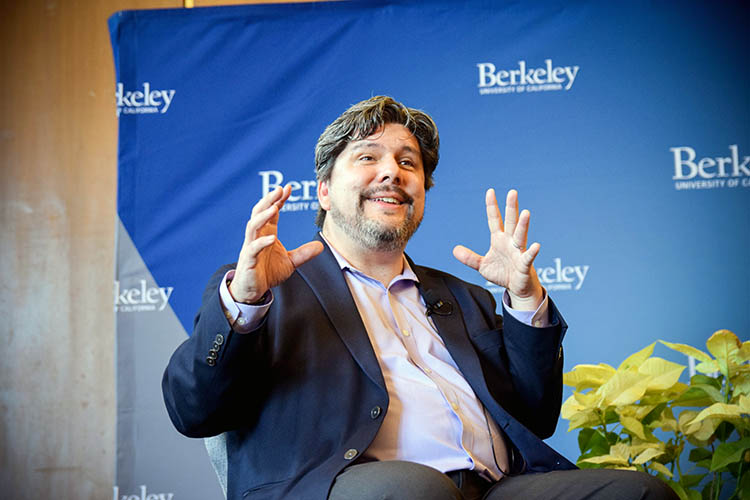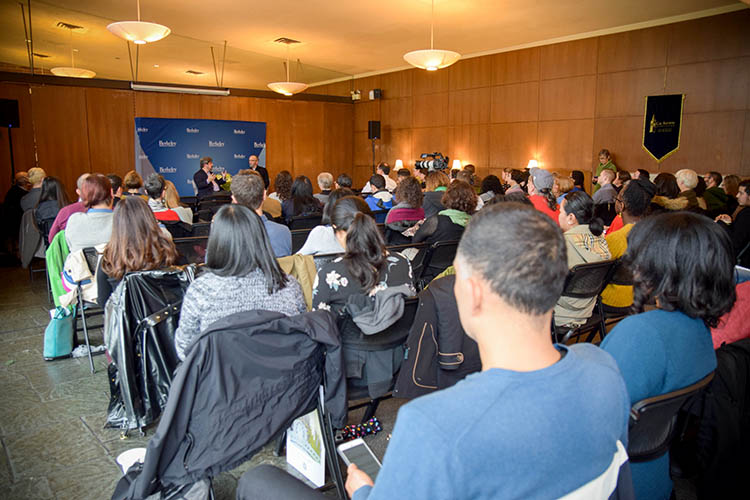Creating a university where we’re all our ‘full, authentic selves’
'When we promote belonging, we can bring our full, authentic selves to every part of the campus,' top administrator says

February 27, 2019
UC Berkeley has been a decades-long leader in world-changing research, economic empowerment and accessible public education, but those credentials don’t let it off the hook from the hard work of dealing with issues of diversity, equity and inclusion, Oscar Dubón, the top campus administrator whose job it is to address those issues, said Wednesday.
Dubón, vice chancellor for equity and inclusion, spoke during a Campus Conversation talk, a monthly event where students, staff and faculty hear from and question campus leaders.
More ‘Campus Conversations’
Watch recordings of other conversations you might have missed
“There is a special challenge working at a place like UC Berkeley, which has been associated for so many years with excellence,” said Dubón, who first came to Berkeley as a materials science and engineering graduate student in 1989. “If you’re an excellent institution, why do you need to change?”
But excellence, especially when it comes to diversity and community, is relative, Dubón said.
“What was excellent 100 years ago is now being defined in a different way,” he said.
The mission of his 170-person team in the Division of Equity and Inclusion is to make UC Berkeley a place that invites all students, staff and faculty to be “their full, authentic selves.”
Getting there will require difficult conversations and changing the way Berkeley does business, including increasing efforts to diversify the faculty, student body and administration without funning afoul of state laws that bar Berkeley from considering race in hiring or admissions decisions.
Dubón talked about institutional barriers that must change, including improved outreach and hiring processes. He also said the Berkeley community must recognize how the white, male history of the school informs the culture of the campus today.
“There is an idea of racism without racists,” he said. “We may all embrace not being racists, but it still doesn’t mean that racism is not going to exist, because the very structures that are there have been leading to a disparate impact, based on race, ethnicity and gender.”
“We need to be involved in co-creating a university that embraces the rich history of the campus in the parts that have done well, but also co-create, co-reform, co-transform the institution so that it is meeting the needs of the society that we see now, not the society that we saw when this campus was first founded,” he added.

Dubón spoke to the crowd at Alumni House. (UC Berkeley photo by Megan Lee)
So what can Berkeley do differently? Dubón, who became vice chancellor in July 2017, pointed to detailed plans to diversity the undergraduate student body and faculty, released in the last few months by Chancellor Carol Christ. He said plans for how to diversify the staff and the graduate student body would be released in the coming months.
The uniting idea, Dubón said, has to be fostering a sense of belonging on campus.
“When we promote belonging, we can bring our full, authentic selves to every part of the campus. That’s when all our talents really come to bear on the very, very important issues that we have to deal with,” he said.
Staffer Christine Blaine, who attended the event, said she would take Dubón’s emphasis on belonging back to her work as a career counselor at the Haas School of Business.
“I think focusing on belonging is kind of a good place to start,” Blaine said.
Contact Will Kane at [email protected]